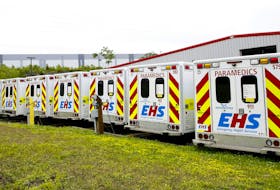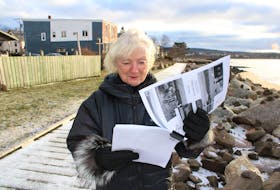TRURO - Nova Scotia should immediately remove its moratorium on building small options homes instead of institutionalizing people with mental health issues into group settings, Brenda Hardiman believes.
"It's like they get them in there and then they can't get them out," the Truro woman said of individuals such as her daughter, Nichelle Benn, who is living in an adult support and rehabilitation facility in Lower Sackville.
Benn, 25, is cognitively delayed to the age of a 12-year-old, Hardiman said. She also has epilepsy and right-sided cerebral palsy, all of which has caused her to act out on numerous occasions with her caregivers.
Those occurrences have led to the police being called on numerous occasions, criminal charges and even incarcerations for Benn. But Hardiman does not think that people with mental health issues, such as her daughter, or others with autism and so forth, should be dealt with through the justice system.
And she said a provincial court judge who heard Benn's case from her most recent episode, in which she slapped a fellow resident who had repeatedly spit in her face, is a case in point.
"She said she hoped that we could find a better solution that didn't involve the justice system," Hardiman said of the Judge Pam Williams' comments. "That spoke volumes."
Now extremely "frustrated" and "disheartened" and fearful of her daughter's future, Hardiman is at her wits end as to where to turn.
After meeting with Community Services Minister Denise Peterson-Rafuse, and receiving assurances that she is aware of a "gap in the system" for people who are mentally capable of making their own decisions but are burdened with some severe type of behavioural problems, Hardiman said the minister has not followed up with another meeting as promised. If anything constructive is being done, Hardiman has yet to see it. And attempts to reach the attention of provincial Justice Minister Ross Landry, she said, have fallen on deaf ears.
During a meeting this week with representatives from Community Services, the RCMP, EHS, the mobile mental health unit and staff from Quest, where her daughter lives, Hardiman was reminded that her options are limited for dealing with her daughter when she has an "escalation" in behavior.
If EHS is called in to assist, she said, their involvement would be a "forced chemical injection" to calm Benn down, an option that Hardiman is totally against. If the RCMP is called, their only option is to remove the person from the site, with the potential of facing criminal charges and incarceration.
"A forced chemical injection is not a solution and incarceration is not a solution. Let's get together and come up with a solution," she said. "Every other province is deinstitutionalizing but Nova Scotia keeps building."
Her daughter used to live in a small options home, where she "thrived" and was cared for by two individuals who were able to place Benn in a therapeutic quiet room when she acted out. But Hardiman said she is told by staff at Quest, that five of their members are not able to safely put Benn into a quiet room.
That leads her to question the training of such staff and also to wonder just how many other individuals with mental health disabilities are facing similar concerns, especially those who do not have regular family visitations.
"This has been very quiet what has been happening. And a lot of people in institutions don't have family that can advocate for them," Hardiman said. "And I think that's what is happening here, that it's happening a lot more often than the public realizes and it's wrong. These are health issues. They are not criminals."








